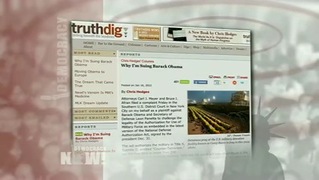
By Amy Goodman with Denis Moynihan
President Barack Obama just announced a reversal of a long-standing policy that denied presidential condolence letters to the family members of soldiers who commit suicide. Relatives of soldiers killed in action receive letters from the president. Official silence, however, has long stigmatized those who die of self-inflicted wounds. The change marks a long-overdue shift in the recognition of the epidemic of soldier and veteran suicides in this country and the toll of the hidden wounds of war.
The denial of condolence letters was brought to national prominence when Gregg and Jannett Keesling spoke about the suicide of their son, Chancellor Keesling. Chance Keesling joined the Army in 2003. After active duty in Iraq, he moved to the Army Reserves, and was called back for a second deployment in April 2009. The years of war had taken a toll on the 25-year-old. As his father, Gregg, told me: “He was trained for the rebuilding of Iraq. He was a combat engineer. He operated big equipment and loved to run the big equipment. Finally, he was retrained as a tactical gunner sitting on top of a Humvee. Because there was really very little rebuilding going on.”
When Chance came home, he sought mental-health treatment from Veterans Affairs. His marriage had failed, and he knew he needed to heal. He turned down the Army’s offer of a $27,000 bonus to redeploy. Ultimately, he was sent back to Iraq anyway. Two months after being redeployed there, Chance took his gun into a latrine and shot himself. The Pentagon reported his death due to “a non-combat related incident.” Adding insult to the injury, the VA, five months after his death, sent Chance a letter that his parents received, asking him to complete his “Post Deployment Adjustment.”
Kevin and Joyce Lucey understand. Their son, Jeffrey, participated in the invasion of Iraq in 2003. Afterward, back home in Massachusetts, he showed signs of post-traumatic stress disorder (PTSD). He and his family found it next to impossible to get needed services from the VA. Jeffrey turned to self-medication with alcohol. He would dress in camouflage and walk the neighborhood, gun in hand. He totaled the family car. One night following his 23rd birthday, Jeffrey curled up in his father’s lap, distraught. As Kevin recalled to me this week: “That night he asked if he could sit in my lap, and we rocked for about 45 minutes and then he went to his room. The following day on June 22, he once again was in my lap as I was cutting him down from the beams.” Jeffrey hanged himself in the Luceys’ basement. On his bed were the dog tags taken from Iraqi soldiers whom he said he had killed.
Since Jeffrey was technically a veteran and not active duty, his suicide is among the suspected thousands. Kevin Lucey summarized, in frustration: “The formal count of suicides that you hear is tremendously underestimated. … Jeff’s suicide is among the uncounted, the unknown, the unacknowledged. We have heard of presidential study commissions being established almost every year. How often do you have to study a suicide epidemic?”
There is no system for keeping track of veteran suicides. Some epidemiological studies by the Centers for Disease Control and Prevention and others suggest that the suicide rate among veterans is seven to eight times higher than in the general population. One report, from 2005 and limited to 16 states, found that veteran suicides comprised 20 percent of the total, an extraordinary finding, given that veterans make up less than 1 percent of the population. PTSD is now thought to afflict up to 30 percent of close to 2 million active-duty soldiers and veterans of the Iraq and Afghanistan wars. Unemployment among young male veterans is now more than 22 percent.
Take one base: Fort Hood, Texas. Maj. Nidal Hasan faces the death penalty for allegedly murdering 13 people there in November 2009, a horrific attack heavily spotlighted by the media. Less well known is the epidemic of suicides at the base. Twenty-two people took their own lives there in 2010 alone.
Neither the Luceys nor the Keeslings will get a presidential condolence letter, despite the policy change. The Keeslings won’t get it because the decision is not retroactive. The Luceys wouldn’t anyway because it narrowly applies only to those suicides by active-duty soldiers deployed in what is considered an active combat zone.
Sadly, those with PTSD can leave the war zone, but the war zone never leaves them. Some see suicide as their only escape. They, too, are casualties of war.
Amy Goodman is the host of “Democracy Now!,” an independent, daily global TV/radio news hour airing on more than 950 stations in the United States and around the world. She is the author of “Breaking the Sound Barrier,” recently released in paperback and now a New York Times best-seller.
© 2011 Amy Goodman












Media Options